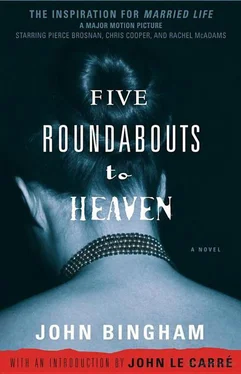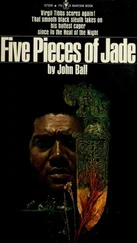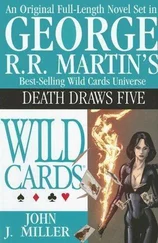John Bingham - Five Roundabouts to Heaven
Здесь есть возможность читать онлайн «John Bingham - Five Roundabouts to Heaven» весь текст электронной книги совершенно бесплатно (целиком полную версию без сокращений). В некоторых случаях можно слушать аудио, скачать через торрент в формате fb2 и присутствует краткое содержание. Жанр: Криминальный детектив, на английском языке. Описание произведения, (предисловие) а так же отзывы посетителей доступны на портале библиотеки ЛибКат.
- Название:Five Roundabouts to Heaven
- Автор:
- Жанр:
- Год:неизвестен
- ISBN:нет данных
- Рейтинг книги:4 / 5. Голосов: 1
-
Избранное:Добавить в избранное
- Отзывы:
-
Ваша оценка:
- 80
- 1
- 2
- 3
- 4
- 5
Five Roundabouts to Heaven: краткое содержание, описание и аннотация
Предлагаем к чтению аннотацию, описание, краткое содержание или предисловие (зависит от того, что написал сам автор книги «Five Roundabouts to Heaven»). Если вы не нашли необходимую информацию о книге — напишите в комментариях, мы постараемся отыскать её.
Five Roundabouts to Heaven — читать онлайн бесплатно полную книгу (весь текст) целиком
Ниже представлен текст книги, разбитый по страницам. Система сохранения места последней прочитанной страницы, позволяет с удобством читать онлайн бесплатно книгу «Five Roundabouts to Heaven», без необходимости каждый раз заново искать на чём Вы остановились. Поставьте закладку, и сможете в любой момент перейти на страницу, на которой закончили чтение.
Интервал:
Закладка:
“She likes you,” he insisted.
“How do you know?”
“I could see. I can always tell when Lorna likes somebody.”
I hesitated deliberately. “Oh, well,” I said, “perhaps one of these days I’ll call in. I’ll see.”
So he gave me Lorna Dickson’s address. More, he gave me exact details of how to find her house. He said he wanted to make absolutely sure that I would find it all right. Fool.
My attitude towards Bartels is changing as I write the record. I know that. It is changing as it changed that day when I revisited the chateau and relived this story.
I was always tougher than Bartels. More efficient. More worldly and realistic. Bartels was a dreamer, I am not. It is no good being a dreamer if you are running hotels. Perhaps that is why he liked me and respected me.
So I always start off by thinking of the Bartels of my youth with nostalgic affection. But as this story progresses, as I see how I fooled him and beat him, all along the line, I begin to lose patience with him. I know-indeed, I insist-that despite everything he was a gentle-hearted and kindly fellow. And I pity him, but in a contemptuous kind of way. This I regret, but cannot help.
Just beyond Cobham there is a fork in the road; the left branch carries on to Guildford, the right one leads to Byfleet and Woking. You have to take the Woking road, and follow it for some time before you come to the lane in which Lorna Dickson’s house was situated. It was while Bartels was in Manchester that I visited her first.
I found the house quite easily, thanks to Bartels’ instructions, despite the darkness and some falling sleet.
It lay behind a thick yew hedge considerably older than the house, so that I was not surprised to learn later that the modern house had been built upon the site of a couple of early Victorian labourers’ cottages.
A wrought-iron gate opened on to a stone-flagged path which led past a flower bed and small lawn to the white front door. Two apple trees stood in front of the house, and the house itself, built of light red brick, was pleasant enough with its clean, straight lines, and large windows. It was not large, having, as I learnt later, a drawing room, dining room, workroom, and kitchen downstairs, and, upstairs, three bedrooms and a bathroom.
I had telephoned her and told her I would like to call in at about 6 p.m. on my way back to London from Winchester. She must have heard my car draw up in the lane, for she had opened the front door, and switched on the porch light, by the time I had passed through the wrought-iron gate.
So I saw her for the second time: standing in the doorway, slim, of medium height, small-boned; dressed in a black barathea coat and skirt, and a turquoise-blue blouse. The light fell on her wavy, light brown hair, and, when she shook hands with me and looked me in the face, I thought once again that she had the most attractive eyes I had ever seen. It occurred to me, too, that her face combined, in a most unusual manner, well-defined features with un-doubted prettiness. The two do not normally go together. It was a face which would wear well through the years; a face which would look handsome in middle age and even old age.
Glancing over what I have written, I see that I have completely failed to describe the charm of Lorna Dickson. I have used the word handsome, yet to me, when that word is applied to a woman, it conjures up somebody rather Juno-esque and forbidding. Lorna was not at all forbidding. Again, I have said that her eyes were attractive, and that might somehow imply a certain superficiality, or lack of intelligence, but Lorna, as I soon discovered, was a very intelligent woman.
I followed her into the house, and into the drawing room. This was a pleasantly proportioned room, in which modern decorations had been combined with antique furniture and with comfort: for one thing, there were a couple of deep armchairs, and a large, chintz-covered settee in front of the fire.
A bright fire was burning; not one of those depressing affairs which depend upon logs for an uneasy flame and a trickle of smoke but a businesslike fire of logs and coal combined; a fire built to warm and cheer.
On a rug in front of the fire a corgi dog lay, looking like a cylindrical woolly bear, and pricked his ears when I came in.
I liked the look of the tray of drinks on a side table, and wondered whether Bartels had supplied them, and paid for them, at trade prices. She gave me a whisky and soda, and helped herself to a gin and Italian. I drank the whisky without a qualm.
I didn’t care if Bartels had paid for them or not. I had come to steal his woman, and I was quite prepared to drink his drink while I did so. If you are going to set fire to a man’s house, there’s no sense in feeling awkward because your cigarette end has singed his mantelpiece.
I had laid my plans carefully, and I felt confident. I was better looking than Bartels-not good-looking, but better looking than Bartels. For one thing I didn’t wear spectacles, and I was better built physically. I had a quicker wit, more experience of the world; and I had a far wider experience of women. Bartels had almost no experience of women.
I was good with women. I knew that most men try to impress women by talking about themselves. They try to show themselves in a clever light, shoot a line, preen their feathers. Women like this for a short while. Then it bores them.
A woman is seriously attracted to the man who talks, not about himself, but about women in general and about her in particular. This never bores her. Nor does it ever bore me to talk about an attractive woman, on the rare occasions when I am with one.
So that’s the way I played it, during the first part of that first evening with Lorna Dickson.
Within a few minutes, by asking questions about silver-framed photographs on the mantelpiece and occasional tables, I had her talking about her family and her own affairs.
Her father, Major Clive Burton, MC, had been killed during the First World War. Her mother, who had a flair for dressmaking, and a circle of friends and acquaintances in the Woking area, had set herself up in business and had built up a reasonable clientele. It was not a flourishing business, not a big money-maker, but it brought in a steady income. And there was a little money from her father’s estate.
There was one other child, Leslie Burton, who was a chartered accountant.
Lorna had helped her mother in the business until she was twenty-three. Then she had married Ronald Dickson, a rubber-planter on leave from Malaya, and in 1938 had sailed with him to Singapore.
Two years later, under protest, but because he wished it, she had sailed for home alone. He had stayed, in the face of the gathering storm, and had been engulfed.
She never saw him again.
She never heard from him again, or, for a long time, received any firm news about him. Only once, through roundabout means, through a friend who had a friend who had fought with Ronnie Dickson, she heard a story that he had last been seen drifting down a river on a raft; wounded, but in good heart. Later, a story trickled through that he had been drowned.
“So I only had him for two years,” she said, standing by the mantelpiece looking down into the fire. “Not long, but by heavens it was worth it. I don’t regret a moment of my life.”
“You’re lucky,” I said.
She looked at me and smiled. “Why? Do you?”
“Lots. Did you never think of marrying again? I mean, until recently.”
She side-stepped the reference to Bartels. She said:
“I had no wish to. I joined the WAAFs, and spent most of the war on a crag in Scotland. Hoping, of course. Watching the post every day for a Red Cross letter, or something. Suspense like that is bad. But it gives you a chance to reconcile your mind.”
Читать дальшеИнтервал:
Закладка:
Похожие книги на «Five Roundabouts to Heaven»
Представляем Вашему вниманию похожие книги на «Five Roundabouts to Heaven» списком для выбора. Мы отобрали схожую по названию и смыслу литературу в надежде предоставить читателям больше вариантов отыскать новые, интересные, ещё непрочитанные произведения.
Обсуждение, отзывы о книге «Five Roundabouts to Heaven» и просто собственные мнения читателей. Оставьте ваши комментарии, напишите, что Вы думаете о произведении, его смысле или главных героях. Укажите что конкретно понравилось, а что нет, и почему Вы так считаете.












